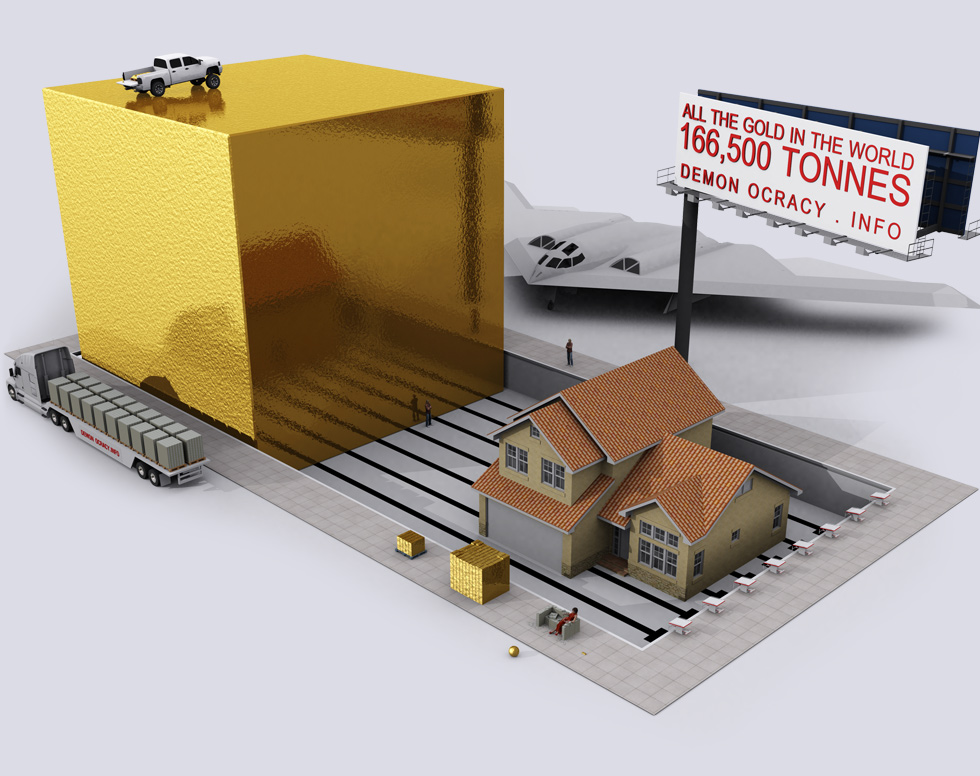
Posted on 07/08/2025 7:32:39 AM PDT by Red Badger

The cube would probably look a little something like this. Image credit: Clark Ukidu / Shutterstock
Hearing stories of the largest gold nugget ever found, or the recent 2.6 kilogram (5.7 pound) discovery by an amateur aussie gold hunter, you might be fooled into thinking we’ve discovered a massive amount of gold on Earth.
Well, it might come as a surprise to learn that all the gold discovered so far could fit inside a puny 23 by 23 meter (75 by 75 foot) cube – that’s about the length of a cricket pitch. Despite its relatively small size, this cube would weigh eight times as much as the Statue of Liberty.
How much gold have we found? The estimated amount of gold mined throughout history is said to be around 187,000 tons, with the total discovered amount being about 244,000 tons. And thanks to gold’s virtually indestructible nature and its ability to be recycled, pretty much all of this is still around.
Around 2,756 to 3,307 tons of gold are mined each year, with more than 30 percent of all gold coming from the Witwatersrand Basin mine in South Africa. Currently, China is the biggest miner of gold, while the single largest gold-mining complex is Barrick Gold’s Nevada Gold Mines, which produces a whopping 99,223 kilograms (3.5 million ounces) a year.
How much is still underground?
The gold left in the ground is measured either as “reserves”, which are economical to mine at current gold prices, or “resources”, which need more investigation to establish if they’re economical, or need to be sold at a higher price.
The US Geological Survey estimates below-ground reserves to be around 57,000 tons, that’s about 20 percent of discovered gold that is yet to be mined. This would mean we could potentially mine all currently known gold reserves in just over 17 years.
But advances in mining technology are making it both easier to discover new reserves and more economical to mine resources, so it’s not likely we’ll pillage all of Earth’s gold any time soon.
Mining companies are now flocking to Victoria, Australia, in what they’re calling a “second gold rush”. Here, they’re utilizing updated understandings of rock formation to better predict the location of gold preserves, and today’s modern drilling equipment is allowing for a higher yield.
Gold in hard-to-reach places There are also a number of gold preserves we’re aware of on Earth that are not economical to mine, and likely never will be.
Known deposits in Antarctica would require extensive equipment and risk to retrieve in the continent’s harsh climate. Similarly, there’s thought to be gold throughout the ocean floor, but with no viable way of getting to it, the value of the yield would never justify the advances.
Looking further afield, there are also gold preserves on the Moon. While we might one day have a lunar base, currently, mining Moon-gold would cost much more than the market value. But maybe the Artemis II crew should pack their gold pans just in case.
“The hunt is on, as is this current generational Gold Bull market we have entered. “
In 2014, you predicted gold would hit $5,000 in 2015.
Now, ten years later, we are less than half way there in today’s dollars.
All I ever find is schist.................😏
Despite its size and weight, some idiot would still try to steal it in the middle of the night with a pick-up truck and a winch.
That’s not gneiss.
😉.................
‘The gold left in the ground is measured either as “reserves”,’....
i believe the terminology is: inferred, indicated, measured, probable, proven
I don’t think this guy knows anything about gold mining.
“All The Gold Discovered In The World Would Fit In A 23 x 23 Meter Cube”
All the humans in the world would fit into a 800 x 800 meter cube.
But there is a big problem that is inevitable. Not in our lifetimes on this forum, but for our descendants.
A meteor has been found on which, it is claimed, there is potentially $1.5 trillion in gold therein.
Eventually this will be mined, and brought back to Earth, if it even needs to be, since markets will likely be Solar Systemic by that point.
This would collapse the value of gold by perhaps 90%.
Therefore, does it not make sense that the ultimate store of value would be crypto, such as Bitcoin, of which there is a set limit of 21 million?
He's a Brit, so..............
Additional perspective would have been helpful.
Probably about right.

A little smaller than a basketball court...........
That’s why it’s valuable - it’s rare... If it was as common as aluminum it would be worth the same as aluminum...
Clearly, I’m going to need to get a bigger shed.
“That’s why it’s valuable - it’s rare... If it was as common as aluminum it would be worth the same as aluminum...”
It is also prettier and doesn’t corrode.
If you laid every human end-to-end around the equator, many of them would drown.

Or of how little gold there is in most of their gold jewelry.
OK, it would cost a little more than aluminum...
Thanks!
Disclaimer: Opinions posted on Free Republic are those of the individual posters and do not necessarily represent the opinion of Free Republic or its management. All materials posted herein are protected by copyright law and the exemption for fair use of copyrighted works.